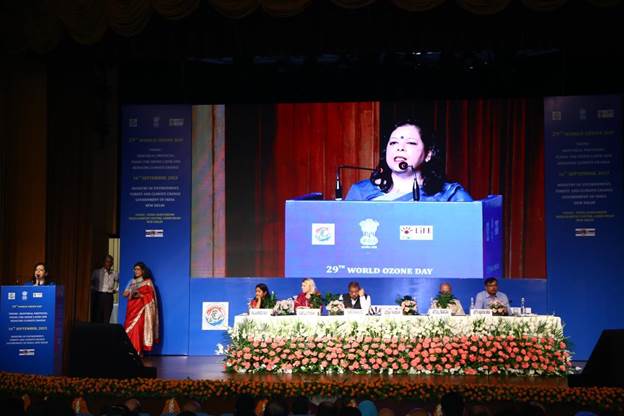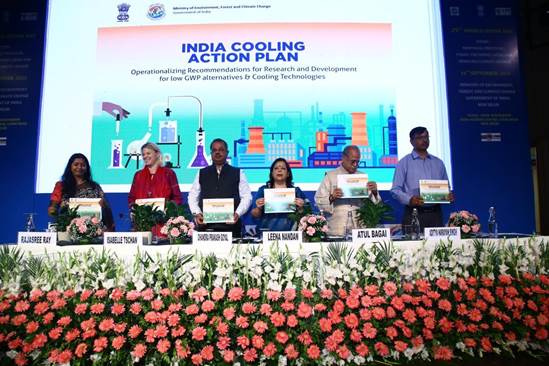Ministry of Environment, Forest and Climate Change Celebrates 29th World Ozone Day
Ministry of Environment, Forest and Climate Change (MoEF&CC), celebrated the 29th World Ozone Day here today. World Ozone Day is celebrated on 16th September each year to commemorate the signing of the Montreal Protocol, an international environmental treaty for phasing out of production and consumption of Ozone Depleting Substances, that came into force on this day in 1987. World Ozone Day is celebrated every year to spread awareness among people about the depletion of Ozone Layer and the measures taken/ to be taken to preserve it. The Ozone Cell, Ministry of Environment, Forest and Climate Change, Government of India has been celebrating the World Ozone Day since 1995 at the National and State levels.
The theme for World Ozone Day 2023 is “Montreal Protocol: fixing the ozone layer and reducing climate change”.

Ms. Leena Nandan Secretary, Ministry of Environment, Forest and Climate Change was the Chief Guest for the event. Addressing the event, she emphasized that India has been proactive in the Montreal Protocol implementation and highlighted achievements of the
country and the new initiatives being taken for preparing for implementation of the Kigali Amendment to the Montreal Protocol for phase down of Hydrofluorocarbons (HFCs). She commended the children for their overwhelming response in the competitions organised by the Ministry on the theme. The Chief Guest also highlighted about the other initiatives of the MOEFCC including LIFE mission and the synergies amongst various activities for protection of the environment.
Shri Atul Bagai, Head UNEP India office and Ms. Isabelle Tschan, Deputy Resident Representative, UNDP India office also addressed participants.

The key highlights of the function include:
Release of Awareness Materials
-
Release of winning entries of National level Poster and slogan competitions for school children.
To create awareness among the students to protect the Ozone Layer, competitions in the categories of Poster and Slogan Writing were organized for school children across the country. For the Poster category, 4686 entries were received and 1466 entries in slogan writing category respectively through a web portal developed for the purpose. The winning entries were finalized by a panel of judges.
-
25th edition of “The Montreal Protocol: India’s Success Story” highlighting India’s achievements in the Montreal Protocol Implementation in phasing out of Ozone Depleting Substances till date.
Release of Publications
-
Action Plan for implementation of the recommendations of the India Cooling Action Plan (ICAP) for (a) Domestic Manufacturing and Production Sector – Alternative Refrigerants and technologies (b) Research and Development and
(c) Servicing Sector. The action plan for each of the 3 thematic areas has been finalized after mapping of the recommendations given in the ICAP with the on-going government programmes/schemes and the proposed actions by different agencies, after extensive discussions with all the concerned stakeholders including line ministries/departments.
-
Stage-III of the HCFC Phase out Management Plan (HPMP), to be implemented from 2023 to 2030 to meet the HCFC phase out compliance obligations of 2025 and 2030. Phase out of HCFCs in manufacturing of new equipment must be completed by 31.12.2024 and complete phase out of HCFCs as on 1.1.2030 for all controlled applications.
-
Study Report on “Sustainable e-commerce cold chain infrastructure”. aims to promote measures for developing e-commerce infrastructure for cold chain which would result in overall development of the cold chain sector in a sustainable manner.
-
Study report on “Public Procurement Policies for Hiring Trained and Certified Refrigeration and Air-Conditioning Service Technicians” aims to examine the benefits associated with the utilization of trained and certified technicians, to evaluate the influence of their specialized knowledge not only in improving the performance of the equipment, but also promoting the energy efficiency of the equipment through good servicing practices.
Documentary Films
-
Animation video of messages by Prakriti on Ozone Layer Protection
-
Documentary film on India’s Success Story on implementation of Montreal Protocol.
The winning entries for poster and slogan competitions and the above-mentioned publications were also be released in the function by the Chief Guest.
Montreal Protocol: A brief background
Ozone Layer exists in the Stratosphere, between 10 KM and 40 KM above the Earth’s surface and protects us from UV radiation from the Sun. Ozone formed in the stratosphere
called stratospheric ozone or good Ozone. Without the Ozone layer, radiation from the sun would reach earth directly, having ill effects on human health, i.e., eye cataract, skin cancer, etc., and adverse impacts on agriculture, forestry and marine life. Manmade chemicals containing chlorine and bromine reach the stratosphere and undergo a complex series of catalytic reactions, leading to destruction of ozone. These chemicals are called Ozone Depleting Substances.
The Vienna Convention, an international treaty on the protection of the Ozone Layer, came into force in 1985. Under this convention, the Montreal Protocol’s came into force in 1987 to repair the ozone layer to protect the earth’s Ozone Layer by phasing out production and consumption of Ozone Depleting Substances for end applications.
The Montreal Protocol provides a set of practical, actionable tasks to phase out ozone- depleting substances. and is one of the most successful and effective environmental treaties ever negotiated and implemented, due to the unprecedented level of cooperation and commitment shown by the international community.
India’s achievements in implementation of Montreal Protocol
India, as Party to the Montreal Protocol since June 1992, has been successfully implementing the Montreal Protocol and its ozone depleting substances phase out projects and activities in line with the phase out schedule of the Protocol. India has phased out Chlorofluorocarbons, Carbon tetrachloride, Halons, Methyl Bromide and Methyl Chloroform for controlled uses as on 1 January 2010, in line with the Montreal Protocol phase out schedule. Currently Hydrochlorofluorocarbons (HCFCs) are being phased out as per the accelerated schedule of the Montreal Protocol. Hydrochlorofluorocarbons Phase out Management Plan (HPMP) Stage-I has been successfully implemented from 2012 to 2016 and Hydrochlorofluorocarbons Phase out Management Plan (HPMP) Stage- II is currently under implementation from 2017 and will be completed by the end of 2024. During HPMP Stage-II implementation, India completely phased out the use of HCFC- 141b in manufacturing of rigid foam, the first among the developing countries to achieve the milestone. As against target of 35% reduction from the baseline as on 1.1.2020, India achieved a reduction of 44%, highlighting India’s efforts in protection of the stratospheric ozone layer.
As part of HPMP Stage-III implementation from 2023-2030, phase out of HCFCs in manufacturing of new equipment will be phased out by 31.12.2024. Implementation of HPMP Stage-III will enable India to achieve compliance with the control targets of HCFCs for the years 2025 and 2030 under the Montreal Protocol. In addition, HPMP Stage-III will result in net direct emission reductions of 19,239,929 tonne CO2 equivalent from 2030 onwards.
The phase out of Ozone Depleting Substances led to the growth of Hydrofluorocarbons (HFCs), used as alternatives to the ODSs, particularly in the refrigeration and air- conditioning sector. While HFCs do not deplete the Ozone Layer, they have high global warming potential ranging from 12 to 14000, which have adverse impact on climate. The decision to add HFCs to the list of controlled substances under the Montreal Protocol during 2016 led to the Kigali Amendment to the Montreal Protocol, under which all Parties shall gradually reduce the consumption and production of HFCs. As per the Kigali
Amendment, India will complete its phase down of production and consumption of HFCs for controlled uses in 4 steps from 2032 onwards with cumulative reduction of 10% in 2032, 20% in 2037, 30% in 2042 and 85% in 2047.
India has ratified the Kigali Amendment to the Montreal Protocol during September 2021 National Strategy for phase down of HFCs in close cooperation with the industry stakeholders shall be developed by 2023.
To have an integrated long-term vision towards cooling encompassing, inter alia, reducing cooling demand, refrigerant transition, enhancing energy efficiency, and advancing technology options, the MoEFCC has developed and launched the India Cooling Action Plan (ICAP) during March 2019, the first of its kind in the world, is to look for synergies in actions having the potential to provide socio-economic and environmental benefits related to reduced refrigerant use, climate change mitigation and Sustainable Development Goals with a 20-year time horizon.
The ICAP recommends synergies with ongoing government programmes and schemes to maximize socio-economic co-benefits. The Government of India has taken steps to operationalize the recommendations given in ICAP after mapping of the recommendations for each thematic area, with the on-going government programmes/schemes and list out actions to be undertaken for achieving the said goals including identifying the required policy and regulatory interventions. The action points for the thematic areas (i)Space cooling in buildings (ii) cold chain(iii) Domestic Manufacturing and Production Sector – Alternative Refrigerants and technologies (iv) Research and Development and (v) Servicing Sector have been finalized and are under implementation by the concerned nodal ministries/departments/agencies. Action points for (i) Domestic Manufacturing and Production Sector – Alternative Refrigerants and technologies (ii) Research and Development and (iii) Servicing Sector are being released today.
Implementation of Actions emerging from ICAP will supplement efforts in adopting climate friendly alternatives and promotion of energy efficiency during the implementation of HFC phase down under the Kigali Amendment, which shall significantly contribute to India’s climate action.
To deliberate on the challenges faced by India in transitioning from HFCs to low GWP alternatives, build indigenous capabilities in developing low GWP refrigerants and upskill human resources for handling low GWP refrigerants, the Ministry, based on a half day workshop held on 4 August 2023, is working on an action plan for indigenous development, which encourages domestic manufacturing of next generation low GWP refrigerants, cooling appliances along with safety standards and upgradation of skill of the existing manpower for wider adoption of such refrigerants during the phase down of HFCs under the Kigali Amendment in close coordination with R&D and academic institutions and line ministries/departments of the Government.
Towards addressing the above, the Ozone Cell, MoEFCC has collaborated with 8 Indian Institutes of Technology (Madras, Roorkee, Kanpur Hyderabad, Varanasi, Patna, Kharagpur and Tirupati) to promote research and development of low global warming potential chemicals, including blends in line with industry requirements through engagement of research scholars.
World Ozone Day reminds us that not only is ozone crucial for life on Earth, but that we must continue to protect the ozone layer for future generations.

